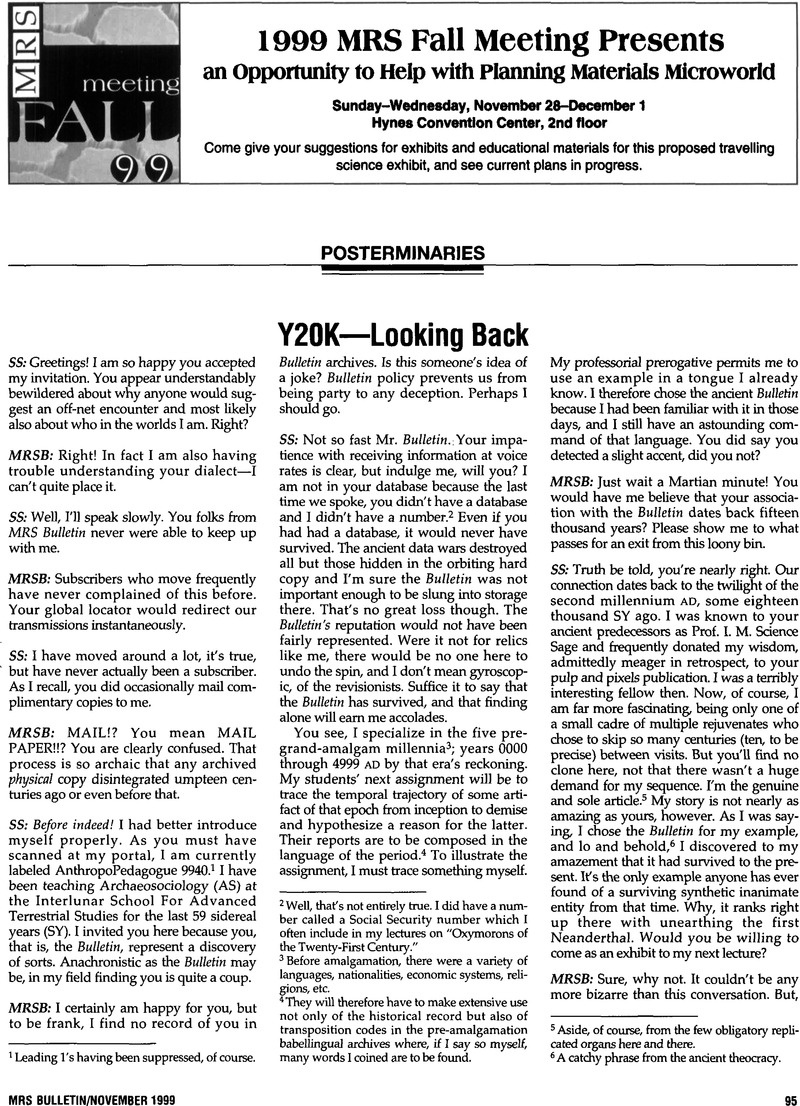Article contents
Y20K—Looking Back
Published online by Cambridge University Press: 29 November 2013
Abstract

- Type
- Posterminaries
- Information
- Copyright
- Copyright © Materials Research Society 1999
References
1 Leading 1's having been suppressed, of course.
2 Well, that's not entirely true. I did have a number called a Social Security number which I often include in my lectures on “Oxymorons of the Twenty-First Century.”
3 Before amalgamation, there were a variety of languages, nationalities, economic systems, religions, etc.
4 They will therefore have to make extensive use not only of the historical record but also of transposition codes in the pre-amalgamation babellingual archives where, if I say so myself, many words I coined are to be found.
5 Aside, of course, from the few obligatory replicated organs here and there.
6 A catchy phrase from the ancient theocracy.
7 I can't remember the last time someone was convicted of committing engineered obsolescence.
8 They had no idea that all their efforts to safely store nuclear waste, to clean up the environment and eliminate industrial pollution, to understand the cosmos and populate a tiny corner of it, to harness new sources of energy, and so forth and so on, would be obviated when those precocious genomists introduced selective discretionary human spedation.
9 And some would say with a lower case s as well!
10 Of course nobody actually wrote by that time and all the walls were graffiti-proof anyway.
11 Actually under water, but thaf s another story.
12 Leave it to the physical types to decide that their movement was so complex that “impedance” was a more accurate term than “resistance.” That was, as it turned out, sadly prophetic, for over time the movement did become fully imaginary.
13 They originally called it the “grand unification,” until someone exposed that term's ancient physical connotation.
14 I do recall, however, that I had many friends whose personalities presaged each of these variants.
15 They would, in fact, find our substitution of mutuality for adversarialism, in a word, wimpy. (See Fellman, Gordon, Rambo and the Dalai Lama: The Compulsion to Win and Its Threat to Human Survival, [State University of New York Press, Albany, NY, AD 1998]Google Scholar, after uncounted reprintings, of course.)
16 The latter group undoubtedly constituting the bulk of your subscribers.
17 My progenitors had no convenient word for the “ten-thousand things” (of Lao Tsu's Too Te Ching) or ten thousand of anything for that matter, so the prefix man- derived from the ancient Japanese crept into the lexicon. (Manium is apparently a lazy contraction of the unwieldy mannennium that, thanks to amalgamation, has survived to this day.)
- 2
- Cited by




